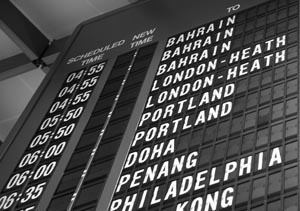International Travel Tips
There are a number of things that you'll need to arrange before you depart for your destination abroad. Travel plans including obtaining passport, visa, and arranging for airport pickup are among the first steps to help get you abroad successfully.
Passport
If you don't have one already, apply for one as soon as possible.
Learn About Your Destination
Before you go, read as much as possible about the country where you will reside. Libraries, bookstores, and tourist bureaus are good resources to find out more information about the country. Check out YouTube videos, student blogs, and travel guides for particularly rich resources. You can also visit a country's Embassy website to locate Consulate information and services. Country-specific consulate websites are full of information for visitors: tourists, students, businesses.
Talk to a Peer
Returned students (students who have been abroad before) will give you information that you can't get from a guidebook. They can give you advice on what to pack, how to make friends, and the cheapest way to call home. If you don't know anyone who has studied abroad, ask your advisor for names and contact information of students who have studied abroad.
Airline Tickets
Start researching flights so you can budget your money. Check out www.studentuniverse.com for cheap, no-overhead flight prices, just for students!
Arrange Your Arrival from Airport to Destination
Some universities arrange to have you picked up at the airport. Be sure to arrange this prior to your departure from the U.S. Many universities and programs also provide you with clear instructions on your arrival and what to do to get from the airport to your next destination. It's also a good idea to travel with contact information for people you may be meeting upon arrival.
Visas
A Visa is the government document required by your host country and is often a stamp in your Passport. Some Visas can take several weeks to obtain so make sure you understand the requirements for your specific Visa. Contact your program provider and the Embassy or Consulate of the country you plan to study in for specific requirements and regulations and specific instructions about how to apply and obtain a visa for your destination.
 Time and Money
Time and Money
Quick Currency Converter - Interactive Web services on the Internet & the world's most popular Internet currency tool. Provides immediate current exchanges for over 180 of the worlds' currencies.
World Clock/Time Zones - Current local times around the world.
Sunrise and Sunset Times - Daily report on the sunrise, sunset and various twilight times for your location.
Keeping in Touch
For many people, the hardest thing about traveling is being away from family and friends. There are plenty of cost efficient ways of maintaining contact with the important people in your life while you are away. If you plan to call anyone while traveling abroad, you definitely need a pre-paid phone card because calling from overseas can be extremely expensive if you don't have one.
Zaptel - Low-rate international pre-paid calling cards.
Skype - Stay in touch using the phone and Internet while you are traveling.
Lonely Planet Phone Cards - Offers ekit's toll-free access numbers for multiple countries
Youth Hostels
 The cheapest places to stay when you are traveling will generally be hostels. Hostels offer basic accommodations, providing anything from a bed in a dormitory with shared bath, to private rooms with private baths. Many hostels are safe, clean, and friendly; however, use common sense, safety and security precautions in order to remain on guard when you are staying in a hostel.
The cheapest places to stay when you are traveling will generally be hostels. Hostels offer basic accommodations, providing anything from a bed in a dormitory with shared bath, to private rooms with private baths. Many hostels are safe, clean, and friendly; however, use common sense, safety and security precautions in order to remain on guard when you are staying in a hostel.
If you are staying somewhere alone, you may want to look into getting a private or semi private room, or a gender-specific room.
Travel Guides
Travel Guides provide an array of valuable information. Specifically, guides offer region, country, and city-specific resources for travel, travel ideas, accommodation, must-sees, and must-dos. In addition to the published guide suggestions below, there are a number of travel websites and blogs that offer tremendous firsthand accounts of location-specific and travel information:
World Electricity Guides
Click here for a table that summarizes information on the electrical systems in use in most countries of the world.

 Time and Money
Time and Money The cheapest places to stay when you are traveling will generally be hostels. Hostels offer basic accommodations, providing anything from a bed in a dormitory with shared bath, to private rooms with private baths. Many hostels are safe, clean, and friendly; however, use common sense, safety and security precautions in order to remain on guard when you are staying in a hostel.
The cheapest places to stay when you are traveling will generally be hostels. Hostels offer basic accommodations, providing anything from a bed in a dormitory with shared bath, to private rooms with private baths. Many hostels are safe, clean, and friendly; however, use common sense, safety and security precautions in order to remain on guard when you are staying in a hostel.